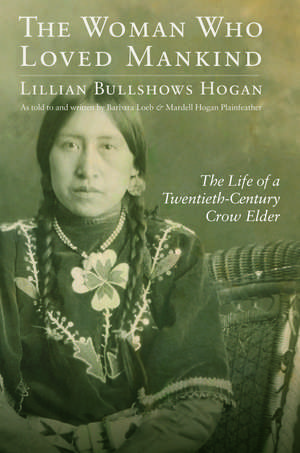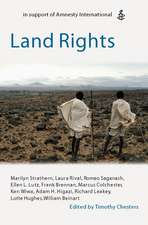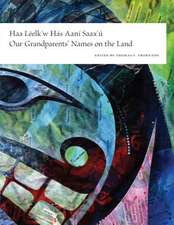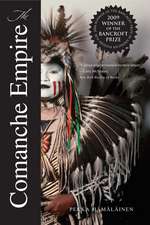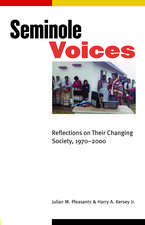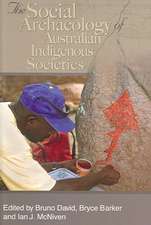The Woman Who Loved Mankind: The Life of a Twentieth-Century Crow Elder
Autor Lillian Bullshows Hogan Editat de Barbara Loeb, Mardell Hogan Plainfeatheren Limba Engleză Hardback – iul 2012
The oldest living Crow at the dawn of the twenty-first century, Lillian Bullshows Hogan (1905–2003) grew up on the Crow reservation in rural Montana. In The Woman Who Loved Mankind she enthralls readers with her own long and remarkable life and the stories of her parents, part of the last generation of Crow born to nomadic ways.
As a child Hogan had a miniature teepee, a fast horse, and a medicine necklace of green beads; she learned traditional arts and food gathering from her mother and experienced the bitterness of Indian boarding school. She grew up to be a complex, hard-working Native woman who drove a car, maintained a bank account, and read the local English paper but spoke Crow as her first language, practiced beadwork, tanned hides, honored clan relatives in generous giveaways, and often visited the last of the old chiefs and berdaches with her family. She married in the traditional Crow way and was a proud member of the Tobacco and Sacred Pipe societies but was also a devoted Christian who helped establish the Church of God on her reservation.
Warm, funny, heartbreaking, and filled with information on Crow life, Hogan’s story was told to her daughter, Mardell Hogan Plainfeather, and to Barbara Loeb, a scholar and longtime friend of the family who recorded her words, staying true to Hogan’s expressive speaking rhythms with its echoes of traditional Crow storytelling.
Preț: 473.48 lei
Nou
Puncte Express: 710
Preț estimativ în valută:
90.60€ • 94.85$ • 74.97£
90.60€ • 94.85$ • 74.97£
Carte tipărită la comandă
Livrare economică 05-19 aprilie
Preluare comenzi: 021 569.72.76
Specificații
ISBN-13: 9780803216136
ISBN-10: 0803216130
Pagini: 496
Ilustrații: 23 illustrations, 1 map, 5 figures
Dimensiuni: 152 x 229 x 15 mm
Greutate: 0.86 kg
Editura: Nebraska
Colecția University of Nebraska Press
Locul publicării:United States
ISBN-10: 0803216130
Pagini: 496
Ilustrații: 23 illustrations, 1 map, 5 figures
Dimensiuni: 152 x 229 x 15 mm
Greutate: 0.86 kg
Editura: Nebraska
Colecția University of Nebraska Press
Locul publicării:United States
Notă biografică
Lillian Bullshows Hogan (1905–2003) was a highly respected Crow elder whose life spanned the twentieth century. Barbara Loeb taught Native art history at Oregon State University. She is the author of Felice Lucero-Giaccardo: A Contemporary Pueblo Painter and numerous writings on Crow and Plateau Indian art and culture. Mardell Hogan Plainfeather is the daughter of Lillian Bullshows Hogan. She is retired as a supervisory park ranger with the National Park Service and as a Crow field director of the American Indian Tribal Histories Project at the Western Heritage Center in Billings, Montana.
Cuprins
List of Illustrations
Acknowledgments
Introduction by Barbara Loeb
Thoughts about My Mother by Mardell Hogan Plainfeather
Genealogies
Chapter One: My Birth and Infancy
Chapter Two: My Mother
Chapter Three: My Father
Chapter Four: My Parents Meet and Marry
Chapter Five: My First Memories
Chapter Six: Boarding School
Chapter Seven: Memories of Youth
Chapter Eight: My Mother Teaches Me to Be a Good Woman
Chapter Nine: Tobacco Iipche (Sacred Pipe Society) and the Medicine Dance (Tobacco Society)
Chapter Ten: We Were Always Hard Up
Chapter Eleven: The Last Years in School
Chapter Twelve: My First Marriage Was to Alex
Chapter Thirteen: We're Adopted into the Tobacco Society
Chapter Fourteen: I Married Robbie Yellowtail
Chapter Fifteen: Paul
Chapter Sixteen: George
Chapter Seventeen: The Kids Are Growing Up
Chapter Eighteen: Sacred Experiences
Chapter Nineteen: Traditional Healing
Chapter Twenty: I Gave Indian Names
Chapter Twenty-One: I'm an Old-Timer
Chapter Twenty-Two: Education
Chapter Twenty-Three: Life as an Elder
Bibliography
Index
Acknowledgments
Introduction by Barbara Loeb
Thoughts about My Mother by Mardell Hogan Plainfeather
Genealogies
Chapter One: My Birth and Infancy
Chapter Two: My Mother
Chapter Three: My Father
Chapter Four: My Parents Meet and Marry
Chapter Five: My First Memories
Chapter Six: Boarding School
Chapter Seven: Memories of Youth
Chapter Eight: My Mother Teaches Me to Be a Good Woman
Chapter Nine: Tobacco Iipche (Sacred Pipe Society) and the Medicine Dance (Tobacco Society)
Chapter Ten: We Were Always Hard Up
Chapter Eleven: The Last Years in School
Chapter Twelve: My First Marriage Was to Alex
Chapter Thirteen: We're Adopted into the Tobacco Society
Chapter Fourteen: I Married Robbie Yellowtail
Chapter Fifteen: Paul
Chapter Sixteen: George
Chapter Seventeen: The Kids Are Growing Up
Chapter Eighteen: Sacred Experiences
Chapter Nineteen: Traditional Healing
Chapter Twenty: I Gave Indian Names
Chapter Twenty-One: I'm an Old-Timer
Chapter Twenty-Two: Education
Chapter Twenty-Three: Life as an Elder
Bibliography
Index
Recenzii
“The Woman Who Loved Mankind is the best of Plains Indian women’s stories ever put into print. Its innovative, conversational format allows readers to almost hear Lillian Bullshows Hogan whispering her personal life and Crow Indian traditions into their ears. It is a stunning achievement and pioneering contribution to American Indian studies, women’s studies, and American literature in general.”—Peter Nabokov, author Two Leggings: The Making of a Crow Warrior
“The vignettes are golden, unpolished nuggets. A few biographies of Native women have been released recently, but this is the only one that allows the speaker’s words to resonate so that the reader may ‘hear’ them. . . . It is an ideal entry into understanding Apsáalooke reservation life. The sensitive presentation of Hogan’s words and memories, coupled with the authors’ introductory statements, provide insights into the development of the Crow reservation through descriptions of changing lifestyles, struggles of family relations, religious and political commitments, and the resilience of Native beliefs and practices. The Woman Who Loved Mankind is a must-read for anyone interested in Native, feminist, or humanistic studies.”—Timothy P. McCleary, Montana: The Magazine of Western History
"This fascinating book is part autobiography, part history, part memoir, part cultural guide, and part poetry. . . . Loeb and Plainfeather made the wise decision to adopt an ethnopoetic approach to the reminiscences, thus preserving not only Lillian's words but also the rhythm and structure of her speaking. This choice elevates the book. The stories themselves are interesting, but the preservation of oral performance lends an intimate and important cultural feel to the work."—J. B. Edwards, Choice
"Hogan's stories read like an epic poem."—Cal Cumin, Billings Gazette
"Essential reading for new and seasoned students and scholars of American Indian cultures."—Kelly M. Branam, Great Plains Quarterly
